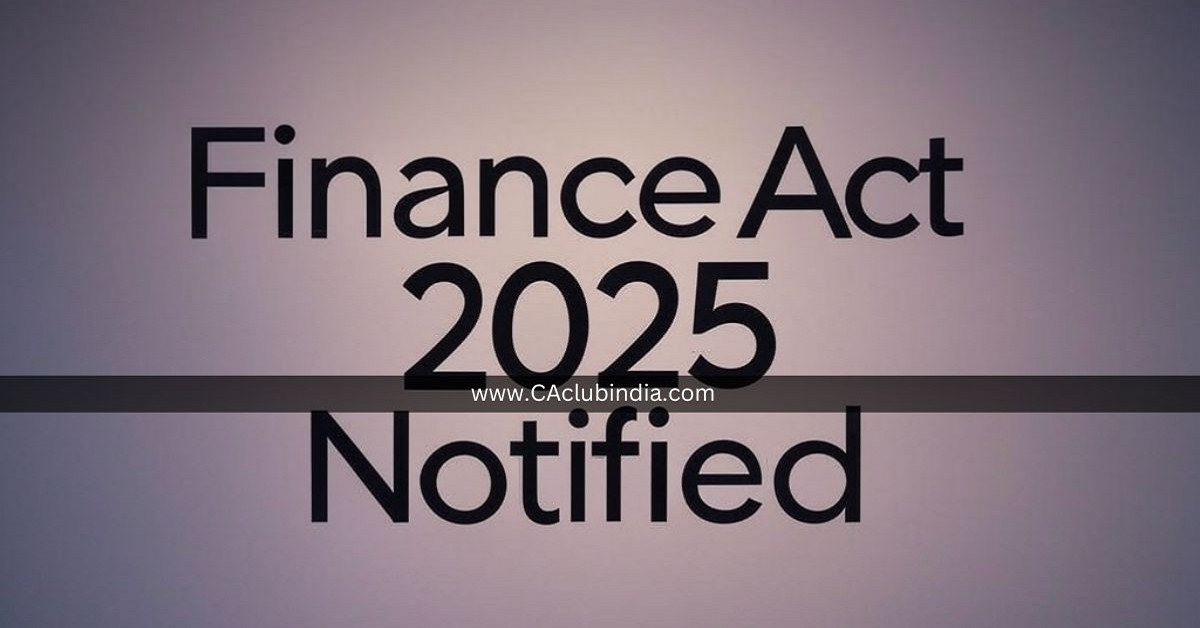The Government of India has officially notified the Finance Act 2025, following its passage in both houses of Parliament and the Presidential assent on March 29, 2025. The new law, published in the official gazette, brings significant reforms in direct and indirect taxation, aiming to simplify compliance, enhance revenue collection, and provide relief to various sectors of the economy.

Key Tax Reforms in Finance Act 2025
1. Income-Tax Changes Effective from AY 2025-26
The tax slabs remain unchanged for individuals, senior citizens, and super senior citizens, but compliance procedures have been streamlined.
For Individuals, HUFs, AOPs, BOIs & Artificial Juridical Persons
- Up to Rs 2,50,000 - No tax
- Rs 2,50,001 - Rs 5,00,000 - 5% on income exceeding Rs 2,50,000
- Rs 5,00,001 - Rs 10,00,000 - Rs 12,500 + 20% on income exceeding Rs 5,00,000
- Above Rs 10,00,000 - Rs 1,12,500 + 30% on income exceeding Rs 10,00,000
For Senior Citizens (60 to <80 years)
- Up to Rs 3,00,000 - No tax
- Rs 3,00,001 - Rs 5,00,000 - 5% on income exceeding Rs 3,00,000
- Rs 5,00,001 - Rs 10,00,000 - Rs 10,000 + 20% on income exceeding Rs 5,00,000
- Above Rs 10,00,000 - Rs 1,10,000 + 30% on income exceeding Rs 10,00,000
For Super Senior Citizens (80+ years)
- Up to Rs 5,00,000 - No tax
- Rs 5,00,001 - Rs 10,00,000 - 20% on income exceeding Rs 5,00,000
- Above Rs 10,00,000 - Rs 1,00,000 + 30% on income exceeding Rs 10,00,000
2. GST and Indirect Tax Amendments (Sections 91-135)
Several amendments have been made to simplify compliance and rationalize taxation, with some provisions taking effect from April 1, 2025.
GST Simplification & Rationalization
- Easier return filing procedures to reduce compliance burden on businesses.
- Rationalization of GST rates on essential goods and services to control inflation.
- Enhanced Input Tax Credit (ITC) mechanisms to support businesses in tax compliance.
Customs & Import Duty Adjustments
- Lower import duties on critical raw materials to boost domestic manufacturing.
- Higher tariffs on luxury and non-essential imports to promote local industries.
- Digitalized customs processes to reduce clearance times and curb tax evasion.
3. Strengthening Digital Economy Taxation
- New tax provisions for e-commerce and cryptocurrency transactions to close loopholes and increase compliance.
- Stricter reporting requirements for digital payments and online businesses to prevent tax evasion.
4. Boost for Startups & Capital Gains Tax Reforms
- Extension of tax holiday for eligible startups, along with incentives for venture capital investments.
- Revised capital gains tax structure, with long-term capital gains linked to inflation indexing to ensure fairness.
5. TDS & TCS Reforms to Improve Revenue Collection
- Adjustments in TDS (Tax Deducted at Source) and TCS (Tax Collected at Source) rates for better tax compliance.
- Automated compliance tools introduced to simplify TDS/TCS filing processes for businesses and individuals.
6. Anti-Tax Evasion Measures & Faceless Assessment Expansion
- Stricter penalties for tax evasion, including enhanced digital tracking and real-time monitoring.
- Expansion of faceless assessment system to reduce manual intervention and enhance transparency.
7. Green Energy Tax Incentives
- Tax benefits for companies investing in renewable energy projects like solar and wind power.
- Reduction in GST for clean energy equipment to accelerate India's transition to green energy.
Conclusion: A Modernized and Stringent Tax Regime
The Finance Act 2025 reaffirms India's commitment to simplified taxation, improved compliance, and economic sustainability. While it provides relief to startups, businesses, and the green energy sector, it also introduces stricter digital economy taxation and anti-tax evasion measures.
Official copy of the notification has been attached








 CAclubindia
CAclubindia
